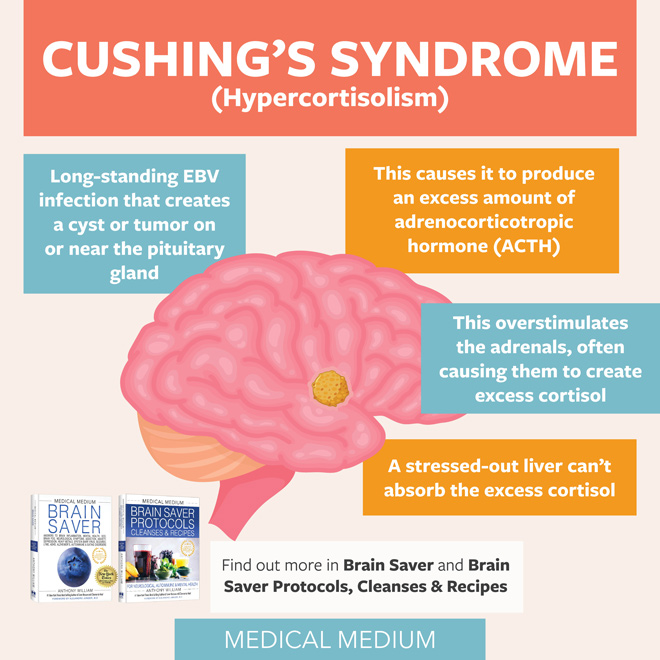
A number of symptoms that could be given a number of diagnoses have been lumped under the Cushing’s umbrella, regardless of whether someone has a pituitary gland cyst or not. Actual Cushing’s is more rare than we think.
Cushing’s is really a result of a long-standing viral infection: EBV is the virus that creates a cyst or tumor on or near the pituitary gland, causing it to produce an excess amount of adrenocorticotropic hormone (ACTH). This overstimulates the adrenals, often causing them to create excess cortisol.
Why could someone be misdiagnosed with Cushing’s? Why else do cortisol levels rise, if it’s not Cushing’s? To begin with, let’s not forget that in many cases, the adrenals are already producing excess cortisol due to diet and lifestyle alone. Also, a high-fat diet and weakened liver causing high blood pressure, weight gain, skin conditions, and muscle loss can look like Cushing’s.
Further, EBV can create cysts and tumors on the pituitary gland or the pituitary cavity that do not trigger ACTH production—and yet cortisol levels can be elevated due to that pre-existing viral infection weakening the liver, which can confuse the doctor into thinking an individual has Cushing’s. The EBV creating a non-Cushing’s pituitary cyst or growth in the brain also lives in the liver and other areas of the body such as the spleen, releasing large amounts of neurotoxins that put stress on the central nervous system, causing fatigue, and forcing the adrenals to work harder and increase cortisol output.
Medical research and science tend to blame all this excess cortisol on the pituitary gland producing too much ACTH without realizing what else could be in play—a chronic viral infection combined with a laboring, stressed-out liver that can’t absorb excess cortisol (or adrenaline) anymore, causing these stress hormones to float rogue through the bloodstream.
Find out how to heal in Brain Saver and Brain Saver Protocols, Cleanses & Recipes.
This item posted: 16-Mar-2023
The information provided on this Site is for general informational purposes only, to include blog postings and any linked material. The information is not intended to be a substitute for professional health or medical advice or treatment, nor should it be relied upon for the diagnosis, prevention, or treatment of any health consideration. Consult with a licensed health care practitioner before altering or discontinuing any medications, treatment or care, or starting any diet, exercise or supplementation program. Neither Anthony William nor Anthony William, Inc. (AWI) is a licensed medical doctor or other formally licensed health care practitioner or provider. The content of this blog and any linked material does not necessarily reflect the opinions of Anthony William, AWI or the principal author, and is not guaranteed to be correct, complete, or up to date.
Thanks for printing this post. For more, visit nwwbettn.top